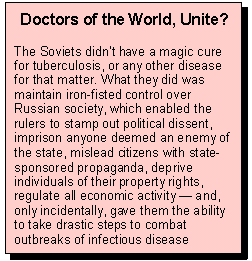 |
||||||||||||||||||||||||
|
||||||||||||||||||||||||
 |
||||||
|
||||||
 |
||||||||||||||||||
|
||||||||||||||||||
 |
|||||||||
|
 |
||||||||||||||||||||||||
|
||||||||||||||||||||||||
 |
||||||||||||||||||||||||
|
||||||||||||||||||||||||
|
What The Media Tell
Americans About Free Enterprise 
Iron-Fisted Soviet Union Still Gets Good Press From The New York Times Freedom may be hazardous to your health. At least that was the implicit message in a December 5 New York Times article which documented the tuberculosis epidemic that is ravaging Russia and which is beginning to leak into the rest of the world. Writing from the Russian city of Voronezh, correspondent Abigail Zuger actually waxed nostalgic about the old Communist regime’s ability to control threats to the general health of the public.
But since the Russian people began their long climb back from totalitarianism, public health has declined. The doctors Zuger interviewed for her story obviously think the suffocating control exerted by the Soviets had its benefits. "In the days of the Soviet Union, the powerful Sanitation and Epidemiology Service, or ‘SanEp,’ sought out infectious diseases and stamped them out with compulsory vaccinations and annual disease screenings," Zuger explained. "People suspected of harboring infection were removed from society for as long as it took to guarantee that they were no longer contagious. The SanEp tactics were brutal — people were often taken from their families and hometowns for months to years — but they were effective." Zuger continued: "‘Now, instead, we have human rights,’ said Alla Loseva, the Voronezh tuberculosis hospital’s deputy chief doctor, rolling her eyes. SanEp is but a poorly funded shell of its former self. Its job has fallen instead to doctors like Ms. Loseva, struggling to contain the epidemic with minuscule budgets and skeletal staffs." Nowhere in her story did Zuger fault the Soviet system for the extreme deprivations it forced on Russian society over many decades. The closest she came to condemning the Communists for anything was when she blamed rising diphtheria rates on both "declining childhood vaccination rates and the vulnerability of adults who had received shoddy Soviet vaccines as children." The Soviets didn’t have a magic cure for tuberculosis, or any other disease for that matter. What they did was maintain iron-fisted control over Russian society, which enabled the rulers to stamp out political dissent, imprison anyone deemed an enemy of the state, mislead citizens with state-sponsored propaganda, monitor and regulate all economic activity — and, only incidentally, gave them the ability to take drastic steps to combat outbreaks of infectious disease. When a people are free to pursue their own dreams, and when their individual rights and property are safeguarded by the state, not threatened by it, a society’s level of affluence and standard of living will inevitably rise. The public health problems that Zuger exposed are fundamentally problems caused by a lack of resources — and it is sixty years of Communist rule that has thwarted the free market and left the Russian people so far behind their Western counterparts. "In the face of desperate medicine shortages, nearly a dozen private and public international health organizations are now collaborating with Russian experts to regain control of the disease," Zuger wrote. Rather than praising the Soviet system, she may want to explore why those Western-based international health groups have the resources to lend a hand now, and how the Communist system so devastated the Russian people’s ability to take care of themselves.
Home | News Division
| Bozell Columns | CyberAlerts |
||||




 "Tuberculosis
is hardly new in Russia," Zuger wrote. "It ravaged the country in
the 19th century and the first half of the 20th. But before the
Soviet Union fell it was finally being brought under control,
through major government effort and expense. Infection rates, though
roughly three times higher than in the United States, were falling
in parallel with those in Europe and developed countries elsewhere."
"Tuberculosis
is hardly new in Russia," Zuger wrote. "It ravaged the country in
the 19th century and the first half of the 20th. But before the
Soviet Union fell it was finally being brought under control,
through major government effort and expense. Infection rates, though
roughly three times higher than in the United States, were falling
in parallel with those in Europe and developed countries elsewhere."